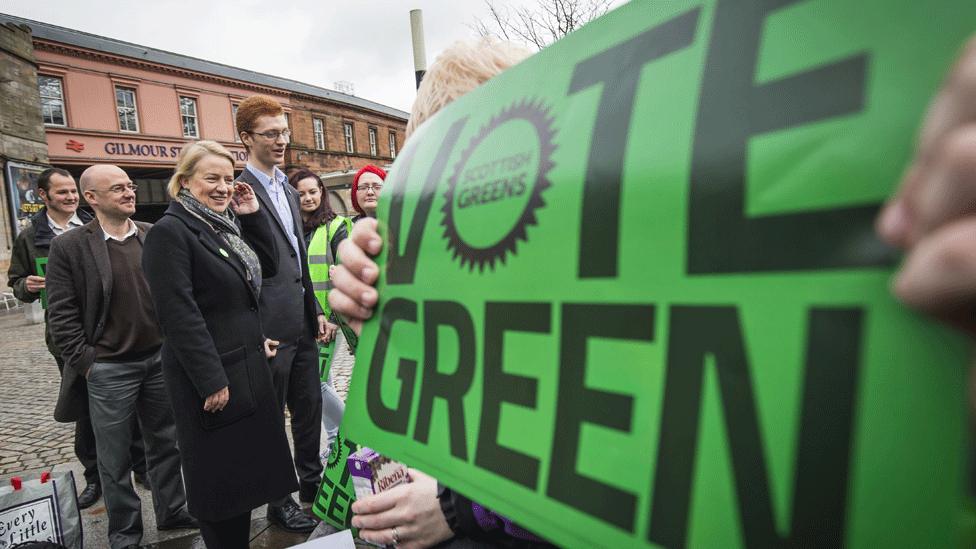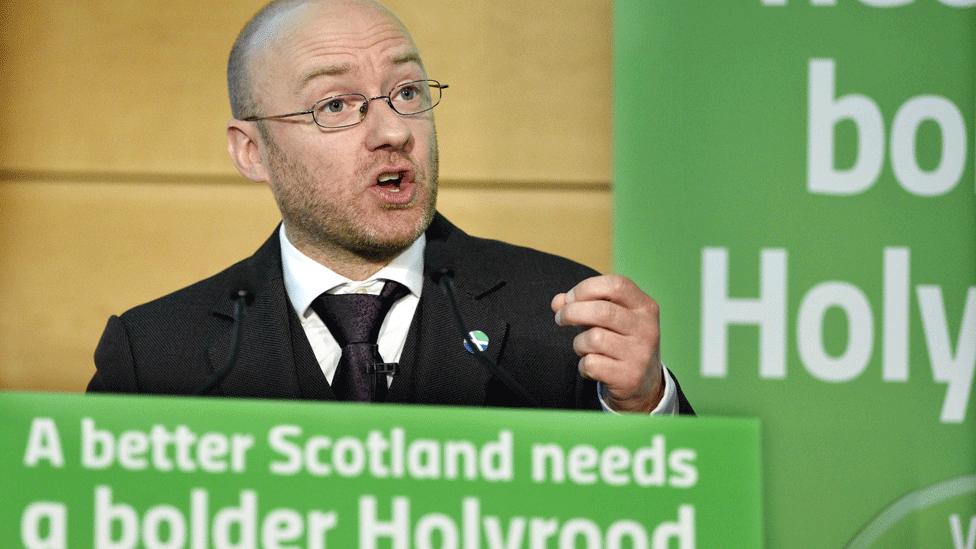Green Party makes case for strong voice at Holyrood
- Published

The Scottish Green Party are aiming to win regional list seats
Being, by nature, an abstemious person - ok, ok, settle down, take that person's name. I repeat, being by nature an abstemious person, I eschewed the substantial fare on offer prior to the Greens' manifesto launch.
However, as I eschewed, others chewed, with evident content. Both Greens and scions of the wicked media alike.
Instead of bacon rolls (what do you mean, you expected tofu), my attention was drawn to the manifesto itself, external, which I read with modest care before the event got under way. Eccentric, I know, but there you are.
The content you can discern elsewhere. Let's talk strategy. Let's talk vocabulary. The manifesto is full of words such as "campaign". No surprise, I hear you say. For any sake, Brian, this is an election.
Fair point, chums. But the manifesto talks of the campaign to be undertaken - after the election is over and settled. The Greens envisage themselves in a campaign to persuade the new Scottish government and First Minister to adopt policies with a verdant hue.
They see themselves pushing, pressing, cajoling - and generally evangelising for their approach to find a place in the Programme for Government or, more realistically, in the various issues which will arise as the next session develops.
That next government? That next First Minister? The Greens are in no doubt. It will be an SNP administration led by Nicola Sturgeon. Their push strategy is aimed in that direction.

Co-convener Patrick Harvie talked of the influece the Greens had had in the last parliament
Indeed, Patrick Harvie, the party's co-convener, went further. Consider the alternatives, he argued. Did Scotland want the SNP to be pulled to the Right by the Conservatives? Did Scotland want the SNP to face a Labour Party which Mr Harvie caricatured as grumpy and ineffective?
Or did Scotland want to cede influence to a Green Party which, according to Mr Harvie, had already shown a capacity to secure concessions in the last Parliament?
For example, he claimed credit for the moratorium on fracking announced the Scottish government - while simultaneously chiding the SNP for stopping short, thus far, of an outright ban.
How much more, he said, could be achieved by a large Green group at Holyrood?
Invited by an esteemed member of the wicked media to name his number one demand, Mr Harvie opted for tax. Which would be quite an ask given that his party favours a 60p top rate of income tax while Nicola Sturgeon has rejected Labour's proposal of a 50p rate.
Their broader economic policy might also be a bit of a stretch for the SNP, given that the Greens favour scaling down the North Sea, "leaving resources in the ground", in a drive for renewables which, they say, could contribute to the creation of 200,000 sustainable jobs.
Still, the Greens are entitled to advance their own programme and see what shakes down. However, rather than relying upon chance and a fair wind, they have a mass campaign in progress, for the first time. Quite simply, they now have a mass party, with nine thousand members - emulating the SNP's post-referendum bounce.
That means a serious canvass. Scotland-wide campaigning. Aimed, almost exclusively, at winning seats on the top-up lists: they are only fighting three constituencies.
Their hope, presumably, is that people may favour them as a second choice. Given that they expect the SNP to win, that means - in practice - they hope to take second votes away from the SNP.
The four major parties - for the avoidance of doubt, SNP, Labour, Conservative, Liberal Democrat - tend to stress the necessity of voting for them not one but twice.
Reaction to the Greens' approach
En passant, I noted a news release from Labour in which they suggested that potential Green voters might care to adopt Labour for their constituency vote. However, such tactics do not undermine Labour's more general argument, evinced by Kezia Dugdale, that the faithful (and formerly faithful) should stay faithful. Twice.
That is certainly the approach of the SNP. Their strategists have many skills. Among which, one might feature arithmetic. They want every vote that is going in pursuit of a majority. In the constituencies. On the lists.
Aware of the potential challenge on the lists from the Greens and others, the Nationalist mantra has been "both votes SNP." That phrase was intoned, solemnly, by virtually every speaker at the spring party conference. Those who forgot received a glower from the chair.
This time, say the Greens, they are ready for that challenge from their rivals. They are better prepared, more professional, better funded.
Which presumably explained the opening fare on offer. But, asked one, did the available grub quite square with the Greens' determination to prise a levy from large retailers who promote unhealthy scoff?
In reply, a smiling confession from Alison Johnstone, she who served in the last Scottish Parliament. Apparently, she rather likes cakes. I won't tell if you don't.